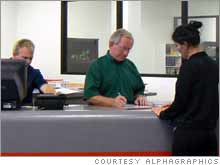|
Ditching the daily grind - 5 who did it
Former executives say that it was rough at times, but that starting their own business was the ultimate promotion.
NEW YORK (CNNMoney.com) - Some suits are finding greater satisfaction working for themselves. And there are a growing number of business-to-business franchises that are well "suited" for former executives who want to put their experience to work, but on their own terms.
Although starting a new business can be risky, here are some examples of people who have beaten the odds to become their own boss. Jim Hewell
Jim Hewell worked for Texas Instruments for 24 years, eventually becoming vice president of consumer products before taking early retirement in 1994 to open his own business. Hewell, 62, and his wife, Sally, opened an AlphaGraphics franchise near Dallas. The business offers digital copying, printing, archiving and mail services. Hewell says he didn't even realize how many of his skills from TI would translate. But now he credits his success to his "healthy appreciation of cash flow, a good knowledge of business from planning to budgets and reporting, and the importance of customer service." "My experience at Texas Instruments showed me the importance of discipline in budgeting and business and I've been able to build that into my own organization," said Hewell, whose business has grown to include 27 employees. "Sometimes I don't even realize it, but the things I learned in those 24 years have been a huge benefit to me today." Hewell says his business is now the third largest AlphaGraphics outlet in the country and pulled in over $3.2 million in revenue last year. But it wasn't all an easy ascent. "The first years were tough. There are a lot of times we slept on the floor of the store trying to get things done." But, despite "a few years when we wondered if we'd done the right thing," Hewell says he has no regrets. According to Joel Libava, a Cleveland-based advisor with FranNet, a franchise consultant, business-to-business franchises are expected to be one of franchising's hottest segments in 2006. These types of franchises allow small businesses to outsource their needs for everything from signage to mailing services. Matt Schuman
Matt Schuman, 33, spent 10 years in accounting before deciding to go out on his own. He parlayed his experience in information technology and his years of meeting clients on the golf course into opening LTS LeaderBoard Tournament Systems in Chicago. Now he works with other business owners to organize golf tournaments and corporate sponsorships. "It's really an IT company that uses proprietary software for the way golf tournaments are managed," Schuman said. But does Schuman still have time to swing the nine iron since leaving the corporate world? "I still play golf, although I play less now that I've started the business." Forrest Bassett
Forrest Bassett, 51, spent over 20 years in the corporate world. He had been a vice president with Mattel, but in 1998 he left his position in Buffalo, N.Y., after the company wanted him to relocate to Los Angeles. Bassett then opened a Signs By Tomorrow franchise in Newport News, Va., with his wife, Linda. "My wife and I decided it was time to do what we wanted to do," Bassett said, and after eight years of double-digit percentage sales growth, Bassett says "it's been better than I expected." When his daughter, Lacy, and her husband, Jason, decided to open up a second location in Chesapeake last year, Bassett let them run with it, noting that they recently won an award for their early success. Beth Stubenrauch
Last December, Beth Stubenrauch, 50, opened a We The People franchise in downtown Boston, offering legal document preparation services for small businesses and consumers who choose to represent themselves in simple, uncontested legal matters. "When I saw We the People I thought this was a good opportunity to do well by doing good. It gave people access to the legal system," Stubenrauch said in a telephone interview. Prior to opening her business, Stubenrauch was a senior vice president at a financial services firm, managing a department specializing in foreign investment operations. "It helped that I had experience managing people and making decisions on how budgets should be spent and doing analysis," she said. But she also said there were challenges she didn't anticipate. "It took me months to find a lease, that was something I wasn't prepared for. Plus, I was the first franchise holder in Massachusetts and there was no brand identity." But, she says, "I still think the product is great." Don Lapp
Don Lapp, 58, served as the VP of human resources for Barnes & Noble from 1989 to 1995. He left New York in 1995 to open his own business, Express Personnel, a privately held staffing firm, in Bradenton, Fla. Although Lapp said he had a serious case of corporate burnout, "I have all the respect in the world for Barnes & Noble but there was a yearning to do something on my own." Lapp's franchise will celebrate its 10th anniversary this year, and he calls it "the greatest thing we've ever done in our lives." "It's my wife and I that are going to make this business go. I like that freedom...that ability to trust yourself." Despite a few rough years at the start, Lapp said, "You can not only make a good living, but also you have something of value." That's something he hopes to cash in once he is ready to retire and sell his business. "That's where the big money is," he said. Spoken like a true suit. ------------------- 5 deadly mistakes when starting a business. Click here. Tips on starting your own gig without quitting your day job. More here.
Can entrepreneurship be taught? Full story. |
|

